Australian Income Tax Law and Practice: Foreigners in Agriculture
VerifiedAdded on 2020/12/18
|10
|2826
|365
Report
AI Summary
This report delves into the Australian income tax landscape, specifically focusing on the taxation of foreigners involved in agricultural businesses. It begins by defining who is considered a foreigner under Australian tax law, outlining the three statutory tests: the domicile test, the 183-day test, and the superannuation test. The report then details the tax treatments that differ for foreigners, including variations in tax rates, capital gains tax, and Goods and Services Tax (GST). It highlights the implications of these treatments, such as the impact on HECS/HELP debts, investments, and existing corporate structures when ceasing tax residency. The report also addresses specific tax concessions available to primary producers in agriculture. The report concludes with recommendations based on the findings. The report provides a detailed overview of how foreign individuals and businesses are taxed within the Australian agricultural sector, covering the relevant legislation, tax rates, and implications for investment decisions.
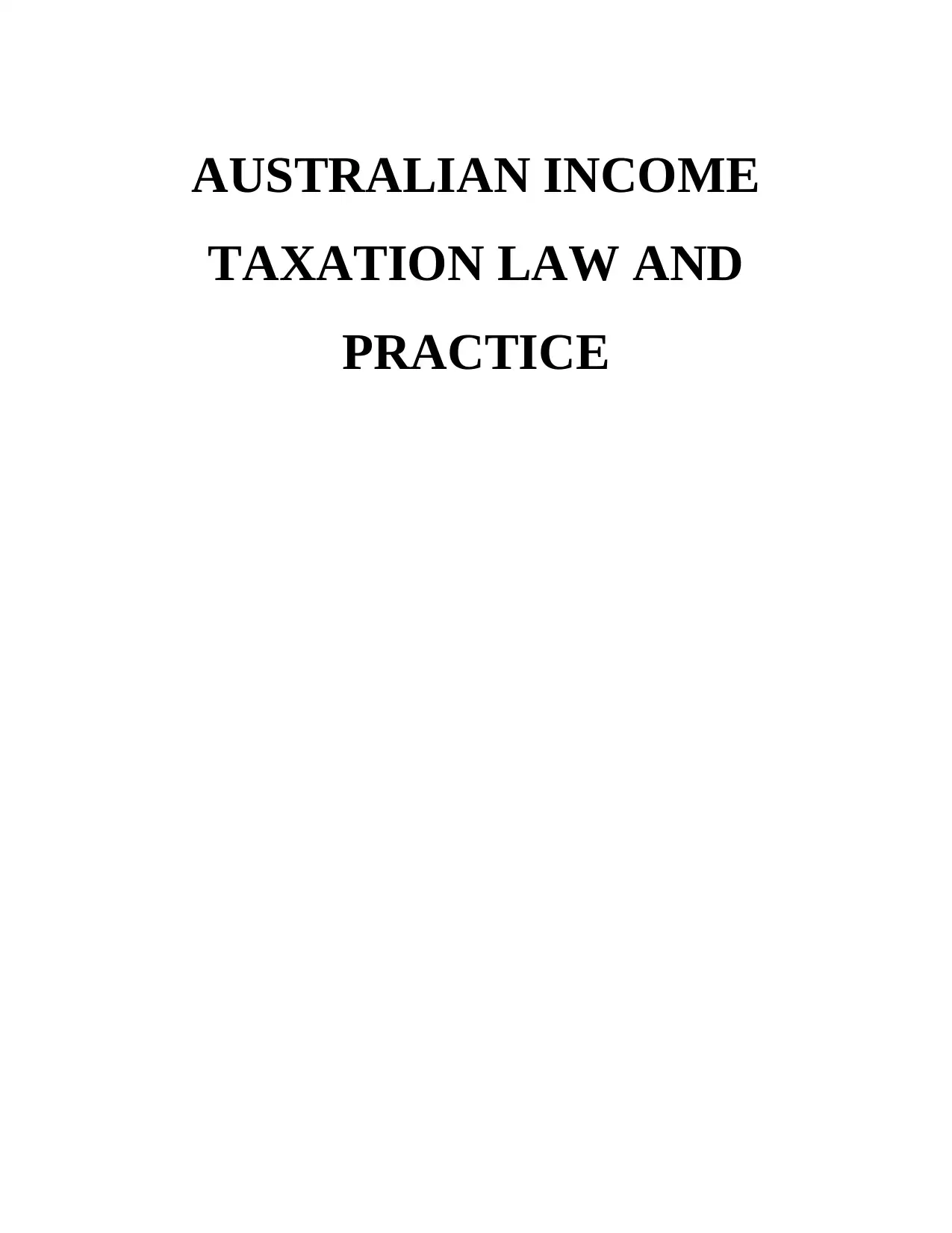
AUSTRALIAN INCOME
TAXATION LAW AND
PRACTICE
TAXATION LAW AND
PRACTICE
Paraphrase This Document
Need a fresh take? Get an instant paraphrase of this document with our AI Paraphraser
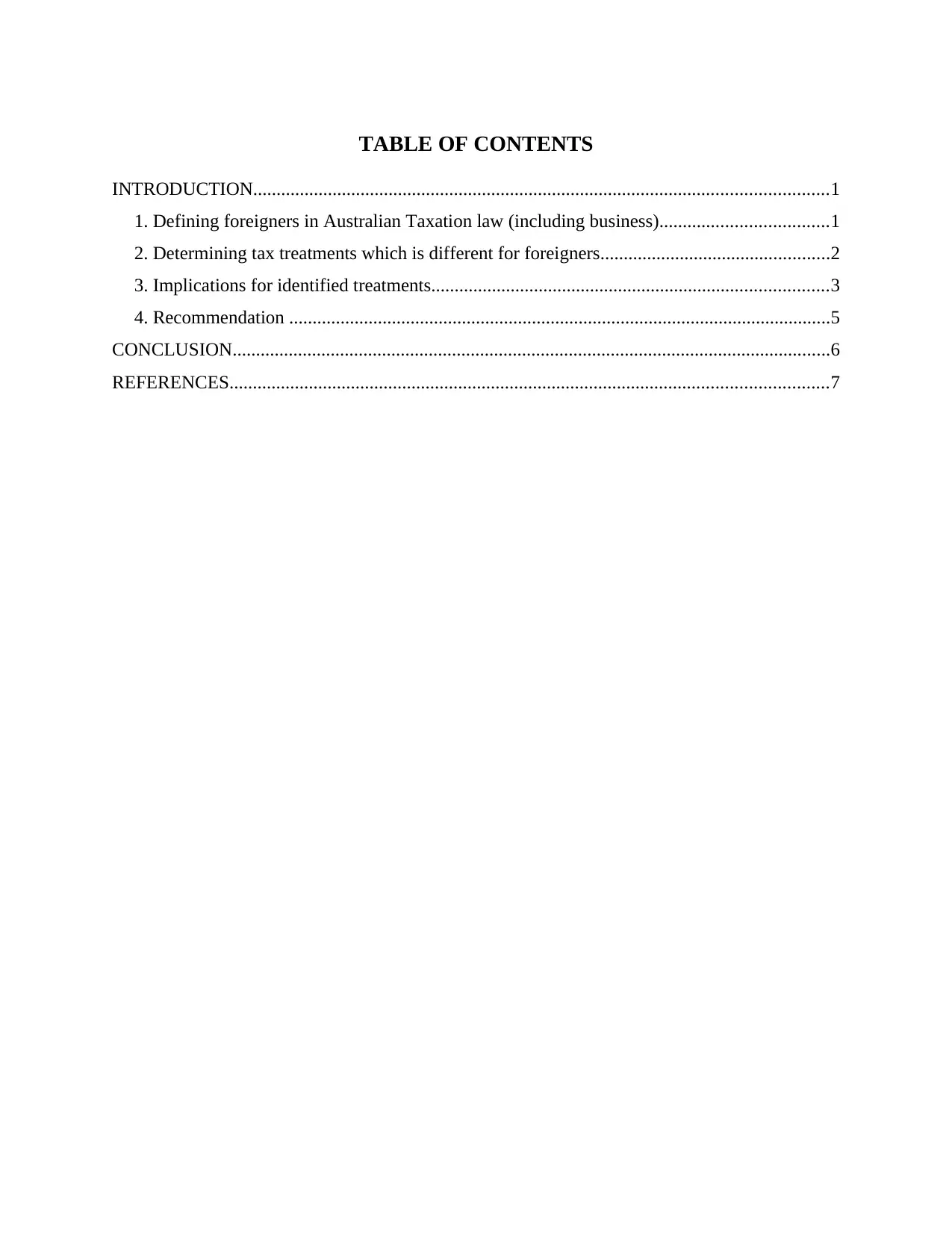
TABLE OF CONTENTS
INTRODUCTION...........................................................................................................................1
1. Defining foreigners in Australian Taxation law (including business)....................................1
2. Determining tax treatments which is different for foreigners.................................................2
3. Implications for identified treatments.....................................................................................3
4. Recommendation ....................................................................................................................5
CONCLUSION................................................................................................................................6
REFERENCES................................................................................................................................7
INTRODUCTION...........................................................................................................................1
1. Defining foreigners in Australian Taxation law (including business)....................................1
2. Determining tax treatments which is different for foreigners.................................................2
3. Implications for identified treatments.....................................................................................3
4. Recommendation ....................................................................................................................5
CONCLUSION................................................................................................................................6
REFERENCES................................................................................................................................7
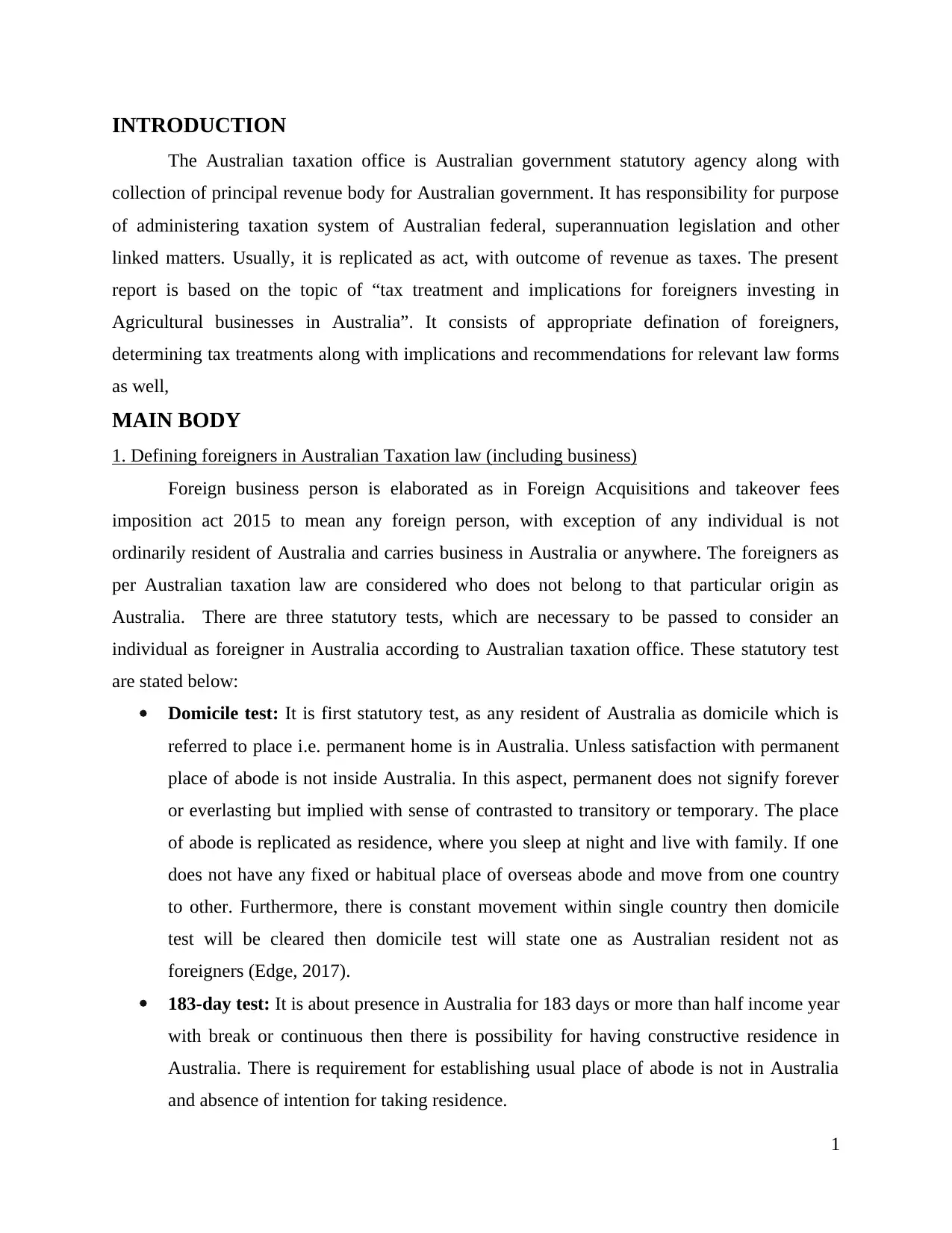
INTRODUCTION
The Australian taxation office is Australian government statutory agency along with
collection of principal revenue body for Australian government. It has responsibility for purpose
of administering taxation system of Australian federal, superannuation legislation and other
linked matters. Usually, it is replicated as act, with outcome of revenue as taxes. The present
report is based on the topic of “tax treatment and implications for foreigners investing in
Agricultural businesses in Australia”. It consists of appropriate defination of foreigners,
determining tax treatments along with implications and recommendations for relevant law forms
as well,
MAIN BODY
1. Defining foreigners in Australian Taxation law (including business)
Foreign business person is elaborated as in Foreign Acquisitions and takeover fees
imposition act 2015 to mean any foreign person, with exception of any individual is not
ordinarily resident of Australia and carries business in Australia or anywhere. The foreigners as
per Australian taxation law are considered who does not belong to that particular origin as
Australia. There are three statutory tests, which are necessary to be passed to consider an
individual as foreigner in Australia according to Australian taxation office. These statutory test
are stated below:
Domicile test: It is first statutory test, as any resident of Australia as domicile which is
referred to place i.e. permanent home is in Australia. Unless satisfaction with permanent
place of abode is not inside Australia. In this aspect, permanent does not signify forever
or everlasting but implied with sense of contrasted to transitory or temporary. The place
of abode is replicated as residence, where you sleep at night and live with family. If one
does not have any fixed or habitual place of overseas abode and move from one country
to other. Furthermore, there is constant movement within single country then domicile
test will be cleared then domicile test will state one as Australian resident not as
foreigners (Edge, 2017).
183-day test: It is about presence in Australia for 183 days or more than half income year
with break or continuous then there is possibility for having constructive residence in
Australia. There is requirement for establishing usual place of abode is not in Australia
and absence of intention for taking residence.
1
The Australian taxation office is Australian government statutory agency along with
collection of principal revenue body for Australian government. It has responsibility for purpose
of administering taxation system of Australian federal, superannuation legislation and other
linked matters. Usually, it is replicated as act, with outcome of revenue as taxes. The present
report is based on the topic of “tax treatment and implications for foreigners investing in
Agricultural businesses in Australia”. It consists of appropriate defination of foreigners,
determining tax treatments along with implications and recommendations for relevant law forms
as well,
MAIN BODY
1. Defining foreigners in Australian Taxation law (including business)
Foreign business person is elaborated as in Foreign Acquisitions and takeover fees
imposition act 2015 to mean any foreign person, with exception of any individual is not
ordinarily resident of Australia and carries business in Australia or anywhere. The foreigners as
per Australian taxation law are considered who does not belong to that particular origin as
Australia. There are three statutory tests, which are necessary to be passed to consider an
individual as foreigner in Australia according to Australian taxation office. These statutory test
are stated below:
Domicile test: It is first statutory test, as any resident of Australia as domicile which is
referred to place i.e. permanent home is in Australia. Unless satisfaction with permanent
place of abode is not inside Australia. In this aspect, permanent does not signify forever
or everlasting but implied with sense of contrasted to transitory or temporary. The place
of abode is replicated as residence, where you sleep at night and live with family. If one
does not have any fixed or habitual place of overseas abode and move from one country
to other. Furthermore, there is constant movement within single country then domicile
test will be cleared then domicile test will state one as Australian resident not as
foreigners (Edge, 2017).
183-day test: It is about presence in Australia for 183 days or more than half income year
with break or continuous then there is possibility for having constructive residence in
Australia. There is requirement for establishing usual place of abode is not in Australia
and absence of intention for taking residence.
1
⊘ This is a preview!⊘
Do you want full access?
Subscribe today to unlock all pages.

Trusted by 1+ million students worldwide
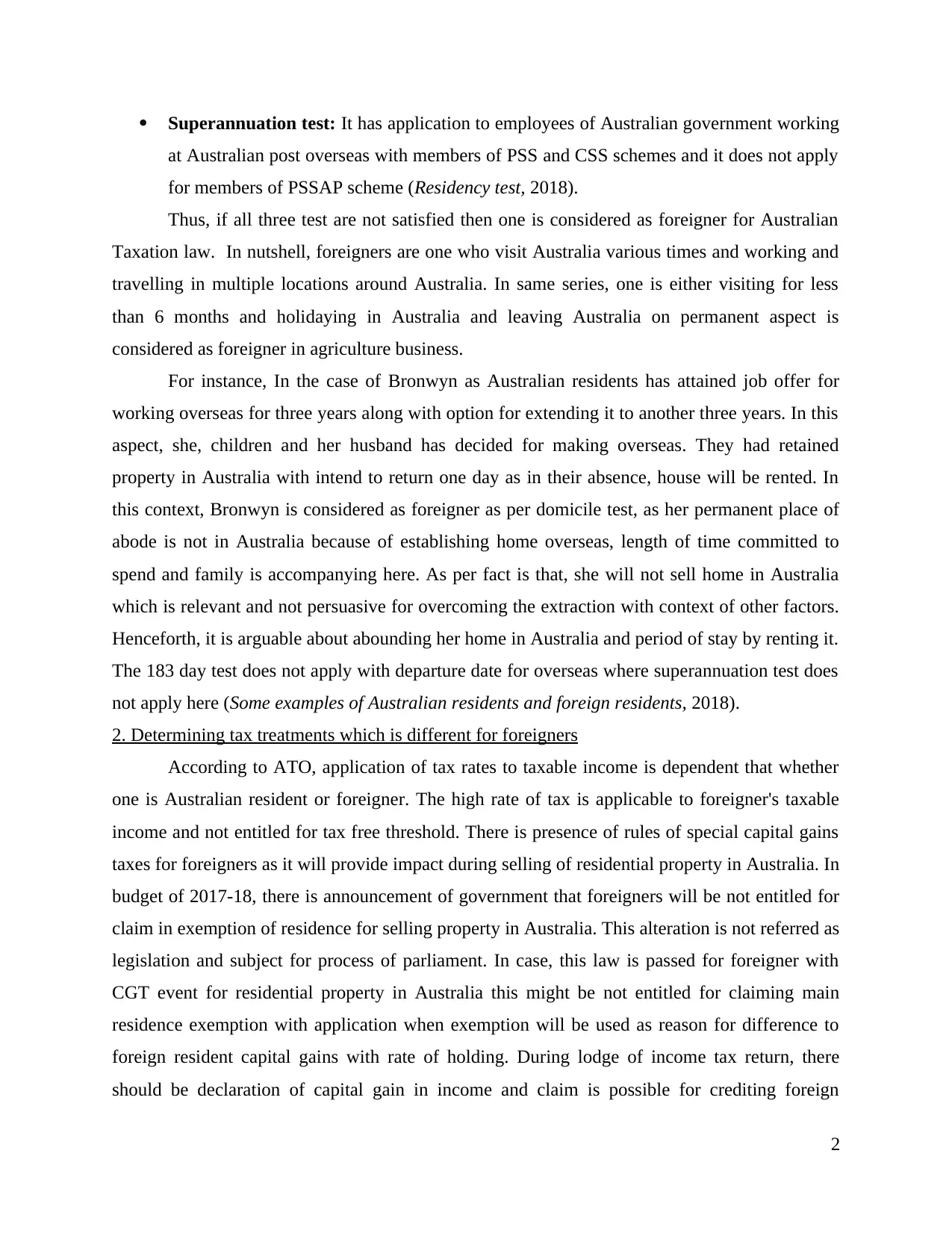
Superannuation test: It has application to employees of Australian government working
at Australian post overseas with members of PSS and CSS schemes and it does not apply
for members of PSSAP scheme (Residency test, 2018).
Thus, if all three test are not satisfied then one is considered as foreigner for Australian
Taxation law. In nutshell, foreigners are one who visit Australia various times and working and
travelling in multiple locations around Australia. In same series, one is either visiting for less
than 6 months and holidaying in Australia and leaving Australia on permanent aspect is
considered as foreigner in agriculture business.
For instance, In the case of Bronwyn as Australian residents has attained job offer for
working overseas for three years along with option for extending it to another three years. In this
aspect, she, children and her husband has decided for making overseas. They had retained
property in Australia with intend to return one day as in their absence, house will be rented. In
this context, Bronwyn is considered as foreigner as per domicile test, as her permanent place of
abode is not in Australia because of establishing home overseas, length of time committed to
spend and family is accompanying here. As per fact is that, she will not sell home in Australia
which is relevant and not persuasive for overcoming the extraction with context of other factors.
Henceforth, it is arguable about abounding her home in Australia and period of stay by renting it.
The 183 day test does not apply with departure date for overseas where superannuation test does
not apply here (Some examples of Australian residents and foreign residents, 2018).
2. Determining tax treatments which is different for foreigners
According to ATO, application of tax rates to taxable income is dependent that whether
one is Australian resident or foreigner. The high rate of tax is applicable to foreigner's taxable
income and not entitled for tax free threshold. There is presence of rules of special capital gains
taxes for foreigners as it will provide impact during selling of residential property in Australia. In
budget of 2017-18, there is announcement of government that foreigners will be not entitled for
claim in exemption of residence for selling property in Australia. This alteration is not referred as
legislation and subject for process of parliament. In case, this law is passed for foreigner with
CGT event for residential property in Australia this might be not entitled for claiming main
residence exemption with application when exemption will be used as reason for difference to
foreign resident capital gains with rate of holding. During lodge of income tax return, there
should be declaration of capital gain in income and claim is possible for crediting foreign
2
at Australian post overseas with members of PSS and CSS schemes and it does not apply
for members of PSSAP scheme (Residency test, 2018).
Thus, if all three test are not satisfied then one is considered as foreigner for Australian
Taxation law. In nutshell, foreigners are one who visit Australia various times and working and
travelling in multiple locations around Australia. In same series, one is either visiting for less
than 6 months and holidaying in Australia and leaving Australia on permanent aspect is
considered as foreigner in agriculture business.
For instance, In the case of Bronwyn as Australian residents has attained job offer for
working overseas for three years along with option for extending it to another three years. In this
aspect, she, children and her husband has decided for making overseas. They had retained
property in Australia with intend to return one day as in their absence, house will be rented. In
this context, Bronwyn is considered as foreigner as per domicile test, as her permanent place of
abode is not in Australia because of establishing home overseas, length of time committed to
spend and family is accompanying here. As per fact is that, she will not sell home in Australia
which is relevant and not persuasive for overcoming the extraction with context of other factors.
Henceforth, it is arguable about abounding her home in Australia and period of stay by renting it.
The 183 day test does not apply with departure date for overseas where superannuation test does
not apply here (Some examples of Australian residents and foreign residents, 2018).
2. Determining tax treatments which is different for foreigners
According to ATO, application of tax rates to taxable income is dependent that whether
one is Australian resident or foreigner. The high rate of tax is applicable to foreigner's taxable
income and not entitled for tax free threshold. There is presence of rules of special capital gains
taxes for foreigners as it will provide impact during selling of residential property in Australia. In
budget of 2017-18, there is announcement of government that foreigners will be not entitled for
claim in exemption of residence for selling property in Australia. This alteration is not referred as
legislation and subject for process of parliament. In case, this law is passed for foreigner with
CGT event for residential property in Australia this might be not entitled for claiming main
residence exemption with application when exemption will be used as reason for difference to
foreign resident capital gains with rate of holding. During lodge of income tax return, there
should be declaration of capital gain in income and claim is possible for crediting foreign
2
Paraphrase This Document
Need a fresh take? Get an instant paraphrase of this document with our AI Paraphraser
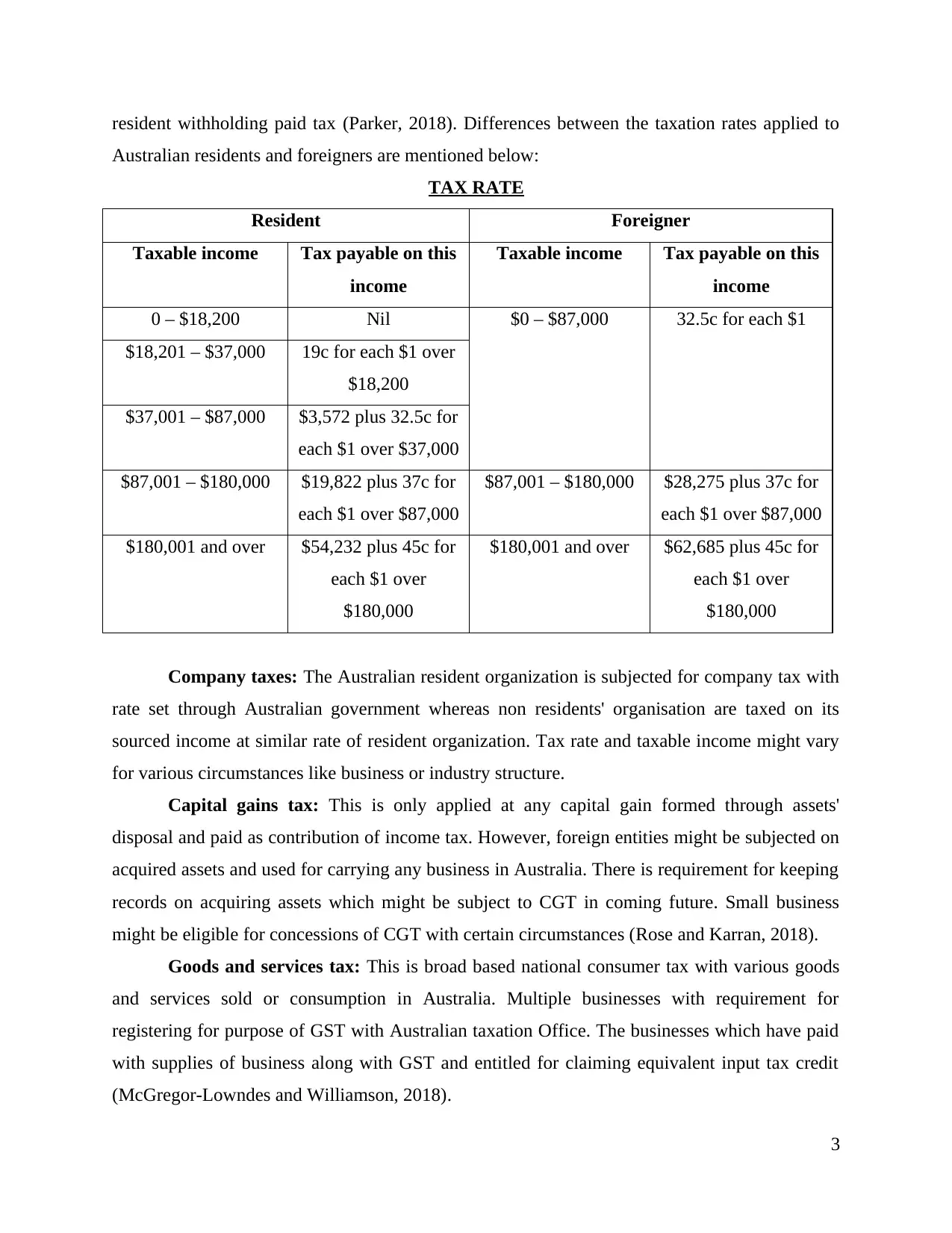
resident withholding paid tax (Parker, 2018). Differences between the taxation rates applied to
Australian residents and foreigners are mentioned below:
TAX RATE
Resident Foreigner
Taxable income Tax payable on this
income
Taxable income Tax payable on this
income
0 – $18,200 Nil $0 – $87,000 32.5c for each $1
$18,201 – $37,000 19c for each $1 over
$18,200
$37,001 – $87,000 $3,572 plus 32.5c for
each $1 over $37,000
$87,001 – $180,000 $19,822 plus 37c for
each $1 over $87,000
$87,001 – $180,000 $28,275 plus 37c for
each $1 over $87,000
$180,001 and over $54,232 plus 45c for
each $1 over
$180,000
$180,001 and over $62,685 plus 45c for
each $1 over
$180,000
Company taxes: The Australian resident organization is subjected for company tax with
rate set through Australian government whereas non residents' organisation are taxed on its
sourced income at similar rate of resident organization. Tax rate and taxable income might vary
for various circumstances like business or industry structure.
Capital gains tax: This is only applied at any capital gain formed through assets'
disposal and paid as contribution of income tax. However, foreign entities might be subjected on
acquired assets and used for carrying any business in Australia. There is requirement for keeping
records on acquiring assets which might be subject to CGT in coming future. Small business
might be eligible for concessions of CGT with certain circumstances (Rose and Karran, 2018).
Goods and services tax: This is broad based national consumer tax with various goods
and services sold or consumption in Australia. Multiple businesses with requirement for
registering for purpose of GST with Australian taxation Office. The businesses which have paid
with supplies of business along with GST and entitled for claiming equivalent input tax credit
(McGregor-Lowndes and Williamson, 2018).
3
Australian residents and foreigners are mentioned below:
TAX RATE
Resident Foreigner
Taxable income Tax payable on this
income
Taxable income Tax payable on this
income
0 – $18,200 Nil $0 – $87,000 32.5c for each $1
$18,201 – $37,000 19c for each $1 over
$18,200
$37,001 – $87,000 $3,572 plus 32.5c for
each $1 over $37,000
$87,001 – $180,000 $19,822 plus 37c for
each $1 over $87,000
$87,001 – $180,000 $28,275 plus 37c for
each $1 over $87,000
$180,001 and over $54,232 plus 45c for
each $1 over
$180,000
$180,001 and over $62,685 plus 45c for
each $1 over
$180,000
Company taxes: The Australian resident organization is subjected for company tax with
rate set through Australian government whereas non residents' organisation are taxed on its
sourced income at similar rate of resident organization. Tax rate and taxable income might vary
for various circumstances like business or industry structure.
Capital gains tax: This is only applied at any capital gain formed through assets'
disposal and paid as contribution of income tax. However, foreign entities might be subjected on
acquired assets and used for carrying any business in Australia. There is requirement for keeping
records on acquiring assets which might be subject to CGT in coming future. Small business
might be eligible for concessions of CGT with certain circumstances (Rose and Karran, 2018).
Goods and services tax: This is broad based national consumer tax with various goods
and services sold or consumption in Australia. Multiple businesses with requirement for
registering for purpose of GST with Australian taxation Office. The businesses which have paid
with supplies of business along with GST and entitled for claiming equivalent input tax credit
(McGregor-Lowndes and Williamson, 2018).
3
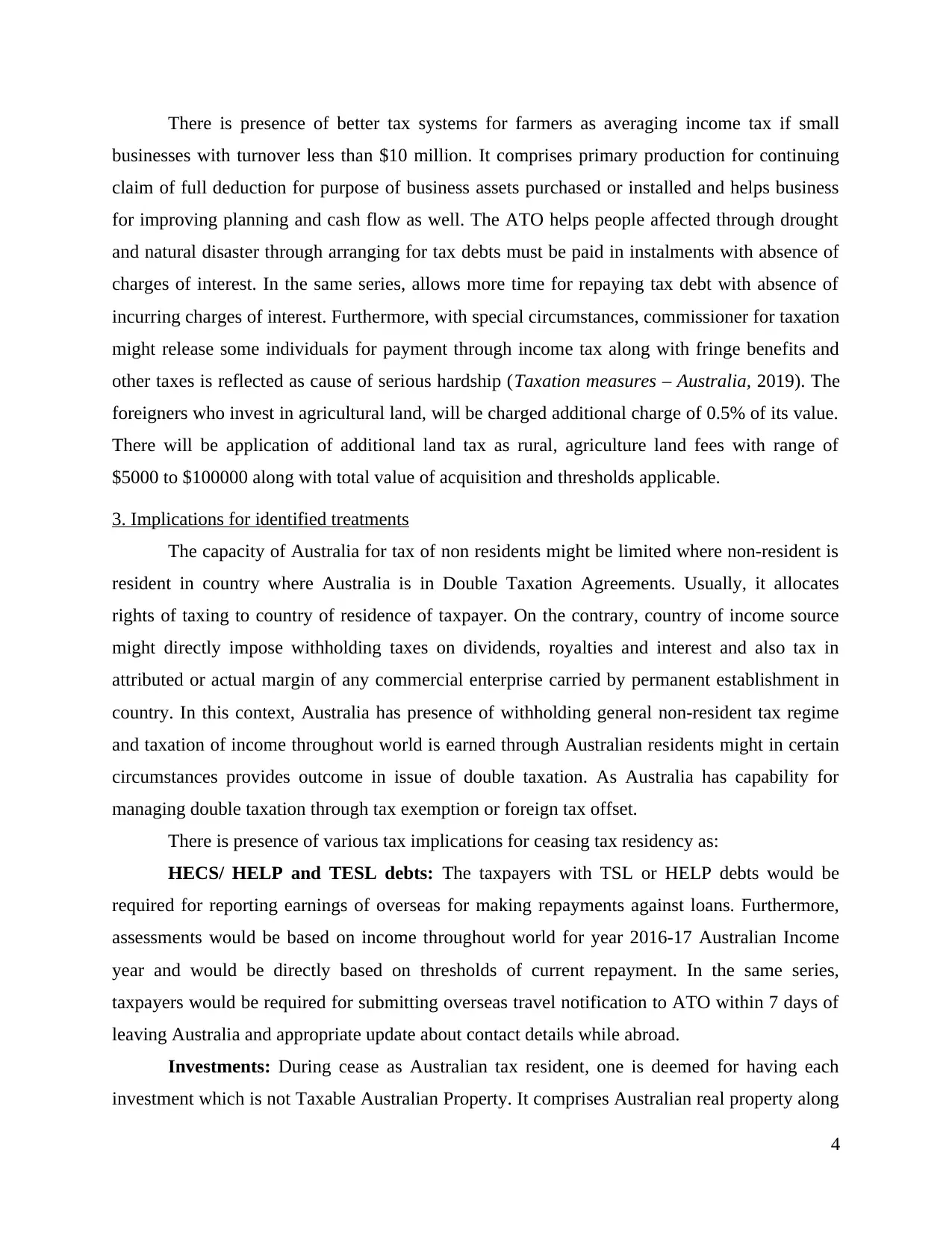
There is presence of better tax systems for farmers as averaging income tax if small
businesses with turnover less than $10 million. It comprises primary production for continuing
claim of full deduction for purpose of business assets purchased or installed and helps business
for improving planning and cash flow as well. The ATO helps people affected through drought
and natural disaster through arranging for tax debts must be paid in instalments with absence of
charges of interest. In the same series, allows more time for repaying tax debt with absence of
incurring charges of interest. Furthermore, with special circumstances, commissioner for taxation
might release some individuals for payment through income tax along with fringe benefits and
other taxes is reflected as cause of serious hardship (Taxation measures – Australia, 2019). The
foreigners who invest in agricultural land, will be charged additional charge of 0.5% of its value.
There will be application of additional land tax as rural, agriculture land fees with range of
$5000 to $100000 along with total value of acquisition and thresholds applicable.
3. Implications for identified treatments
The capacity of Australia for tax of non residents might be limited where non-resident is
resident in country where Australia is in Double Taxation Agreements. Usually, it allocates
rights of taxing to country of residence of taxpayer. On the contrary, country of income source
might directly impose withholding taxes on dividends, royalties and interest and also tax in
attributed or actual margin of any commercial enterprise carried by permanent establishment in
country. In this context, Australia has presence of withholding general non-resident tax regime
and taxation of income throughout world is earned through Australian residents might in certain
circumstances provides outcome in issue of double taxation. As Australia has capability for
managing double taxation through tax exemption or foreign tax offset.
There is presence of various tax implications for ceasing tax residency as:
HECS/ HELP and TESL debts: The taxpayers with TSL or HELP debts would be
required for reporting earnings of overseas for making repayments against loans. Furthermore,
assessments would be based on income throughout world for year 2016-17 Australian Income
year and would be directly based on thresholds of current repayment. In the same series,
taxpayers would be required for submitting overseas travel notification to ATO within 7 days of
leaving Australia and appropriate update about contact details while abroad.
Investments: During cease as Australian tax resident, one is deemed for having each
investment which is not Taxable Australian Property. It comprises Australian real property along
4
businesses with turnover less than $10 million. It comprises primary production for continuing
claim of full deduction for purpose of business assets purchased or installed and helps business
for improving planning and cash flow as well. The ATO helps people affected through drought
and natural disaster through arranging for tax debts must be paid in instalments with absence of
charges of interest. In the same series, allows more time for repaying tax debt with absence of
incurring charges of interest. Furthermore, with special circumstances, commissioner for taxation
might release some individuals for payment through income tax along with fringe benefits and
other taxes is reflected as cause of serious hardship (Taxation measures – Australia, 2019). The
foreigners who invest in agricultural land, will be charged additional charge of 0.5% of its value.
There will be application of additional land tax as rural, agriculture land fees with range of
$5000 to $100000 along with total value of acquisition and thresholds applicable.
3. Implications for identified treatments
The capacity of Australia for tax of non residents might be limited where non-resident is
resident in country where Australia is in Double Taxation Agreements. Usually, it allocates
rights of taxing to country of residence of taxpayer. On the contrary, country of income source
might directly impose withholding taxes on dividends, royalties and interest and also tax in
attributed or actual margin of any commercial enterprise carried by permanent establishment in
country. In this context, Australia has presence of withholding general non-resident tax regime
and taxation of income throughout world is earned through Australian residents might in certain
circumstances provides outcome in issue of double taxation. As Australia has capability for
managing double taxation through tax exemption or foreign tax offset.
There is presence of various tax implications for ceasing tax residency as:
HECS/ HELP and TESL debts: The taxpayers with TSL or HELP debts would be
required for reporting earnings of overseas for making repayments against loans. Furthermore,
assessments would be based on income throughout world for year 2016-17 Australian Income
year and would be directly based on thresholds of current repayment. In the same series,
taxpayers would be required for submitting overseas travel notification to ATO within 7 days of
leaving Australia and appropriate update about contact details while abroad.
Investments: During cease as Australian tax resident, one is deemed for having each
investment which is not Taxable Australian Property. It comprises Australian real property along
4
⊘ This is a preview!⊘
Do you want full access?
Subscribe today to unlock all pages.

Trusted by 1+ million students worldwide
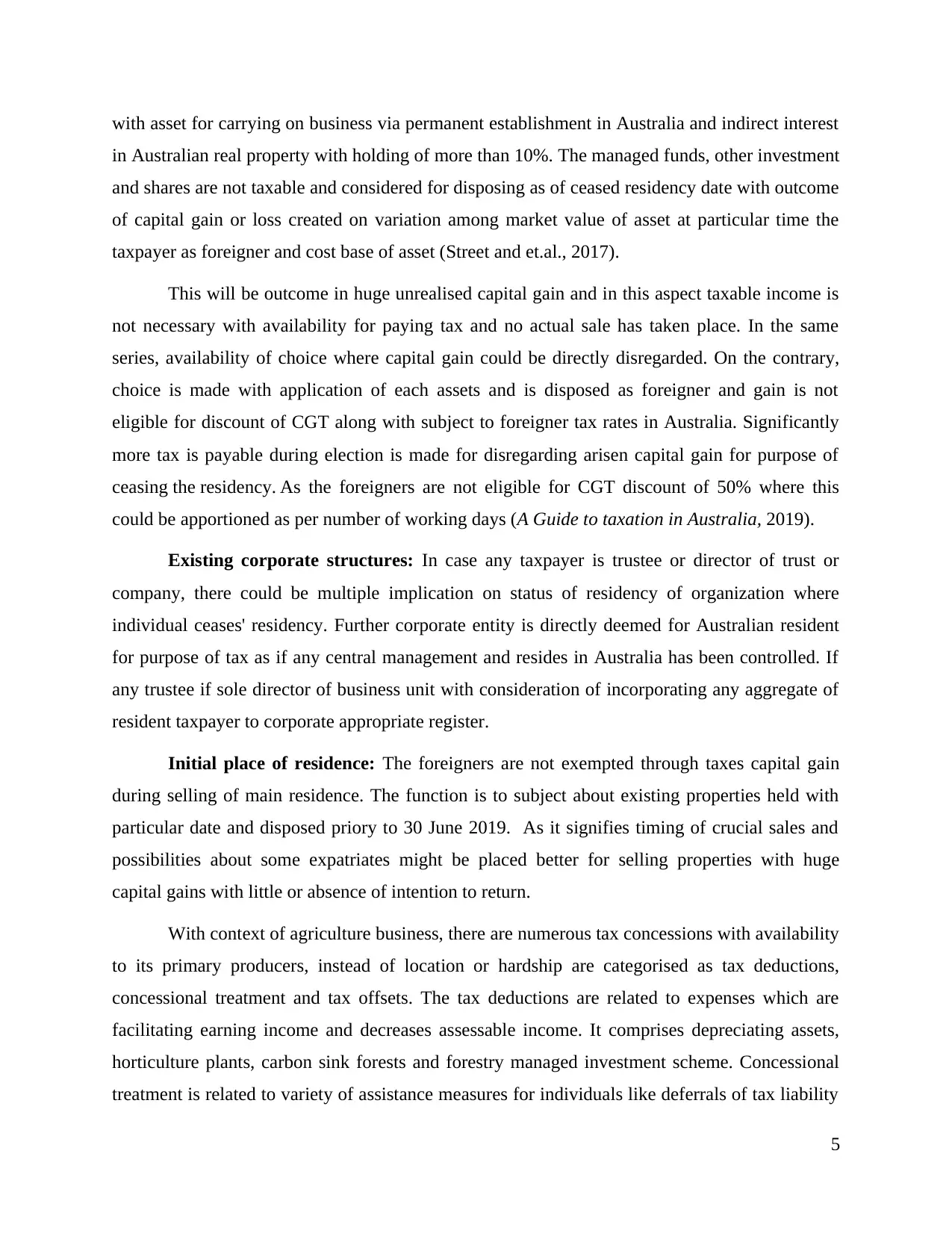
with asset for carrying on business via permanent establishment in Australia and indirect interest
in Australian real property with holding of more than 10%. The managed funds, other investment
and shares are not taxable and considered for disposing as of ceased residency date with outcome
of capital gain or loss created on variation among market value of asset at particular time the
taxpayer as foreigner and cost base of asset (Street and et.al., 2017).
This will be outcome in huge unrealised capital gain and in this aspect taxable income is
not necessary with availability for paying tax and no actual sale has taken place. In the same
series, availability of choice where capital gain could be directly disregarded. On the contrary,
choice is made with application of each assets and is disposed as foreigner and gain is not
eligible for discount of CGT along with subject to foreigner tax rates in Australia. Significantly
more tax is payable during election is made for disregarding arisen capital gain for purpose of
ceasing the residency. As the foreigners are not eligible for CGT discount of 50% where this
could be apportioned as per number of working days (A Guide to taxation in Australia, 2019).
Existing corporate structures: In case any taxpayer is trustee or director of trust or
company, there could be multiple implication on status of residency of organization where
individual ceases' residency. Further corporate entity is directly deemed for Australian resident
for purpose of tax as if any central management and resides in Australia has been controlled. If
any trustee if sole director of business unit with consideration of incorporating any aggregate of
resident taxpayer to corporate appropriate register.
Initial place of residence: The foreigners are not exempted through taxes capital gain
during selling of main residence. The function is to subject about existing properties held with
particular date and disposed priory to 30 June 2019. As it signifies timing of crucial sales and
possibilities about some expatriates might be placed better for selling properties with huge
capital gains with little or absence of intention to return.
With context of agriculture business, there are numerous tax concessions with availability
to its primary producers, instead of location or hardship are categorised as tax deductions,
concessional treatment and tax offsets. The tax deductions are related to expenses which are
facilitating earning income and decreases assessable income. It comprises depreciating assets,
horticulture plants, carbon sink forests and forestry managed investment scheme. Concessional
treatment is related to variety of assistance measures for individuals like deferrals of tax liability
5
in Australian real property with holding of more than 10%. The managed funds, other investment
and shares are not taxable and considered for disposing as of ceased residency date with outcome
of capital gain or loss created on variation among market value of asset at particular time the
taxpayer as foreigner and cost base of asset (Street and et.al., 2017).
This will be outcome in huge unrealised capital gain and in this aspect taxable income is
not necessary with availability for paying tax and no actual sale has taken place. In the same
series, availability of choice where capital gain could be directly disregarded. On the contrary,
choice is made with application of each assets and is disposed as foreigner and gain is not
eligible for discount of CGT along with subject to foreigner tax rates in Australia. Significantly
more tax is payable during election is made for disregarding arisen capital gain for purpose of
ceasing the residency. As the foreigners are not eligible for CGT discount of 50% where this
could be apportioned as per number of working days (A Guide to taxation in Australia, 2019).
Existing corporate structures: In case any taxpayer is trustee or director of trust or
company, there could be multiple implication on status of residency of organization where
individual ceases' residency. Further corporate entity is directly deemed for Australian resident
for purpose of tax as if any central management and resides in Australia has been controlled. If
any trustee if sole director of business unit with consideration of incorporating any aggregate of
resident taxpayer to corporate appropriate register.
Initial place of residence: The foreigners are not exempted through taxes capital gain
during selling of main residence. The function is to subject about existing properties held with
particular date and disposed priory to 30 June 2019. As it signifies timing of crucial sales and
possibilities about some expatriates might be placed better for selling properties with huge
capital gains with little or absence of intention to return.
With context of agriculture business, there are numerous tax concessions with availability
to its primary producers, instead of location or hardship are categorised as tax deductions,
concessional treatment and tax offsets. The tax deductions are related to expenses which are
facilitating earning income and decreases assessable income. It comprises depreciating assets,
horticulture plants, carbon sink forests and forestry managed investment scheme. Concessional
treatment is related to variety of assistance measures for individuals like deferrals of tax liability
5
Paraphrase This Document
Need a fresh take? Get an instant paraphrase of this document with our AI Paraphraser
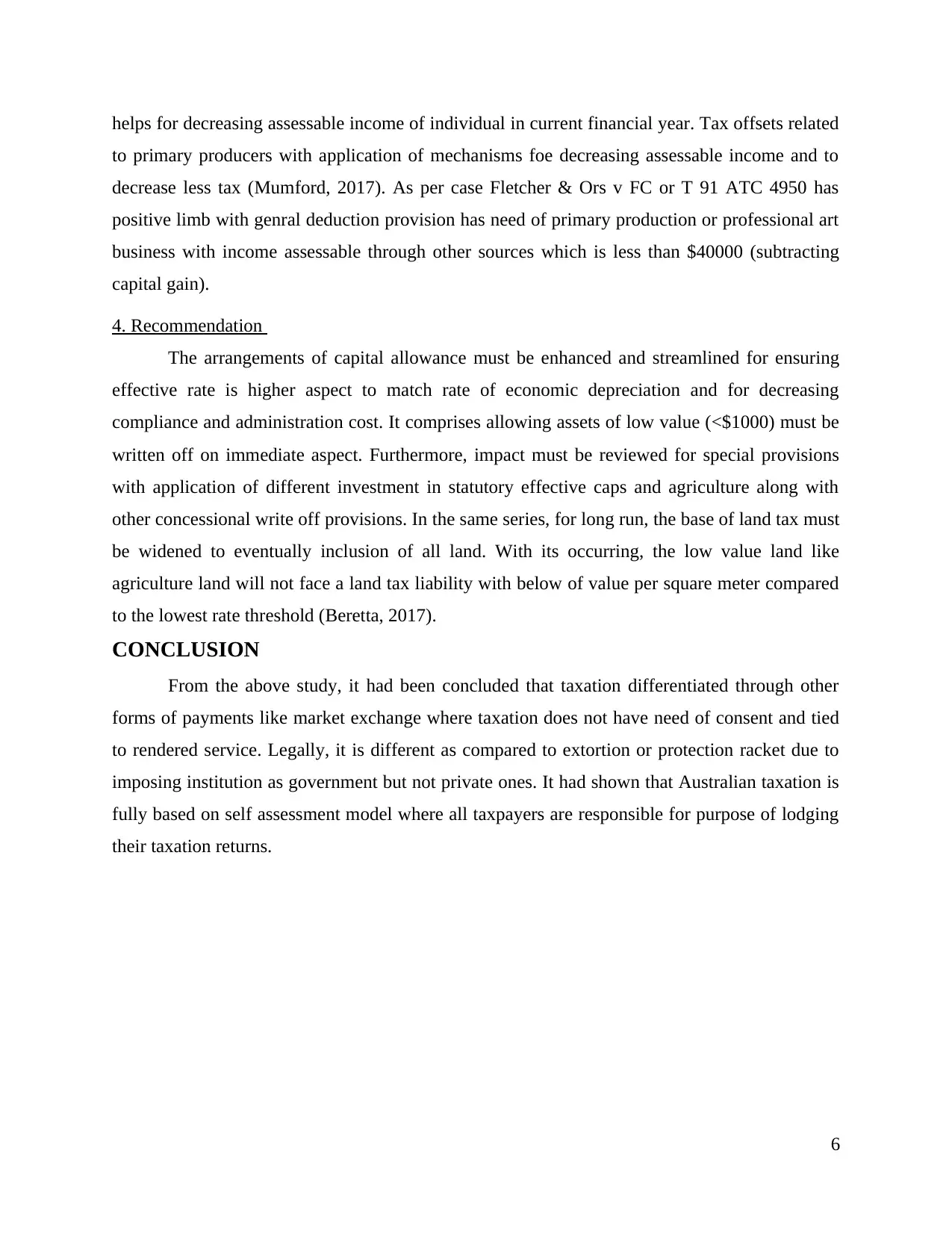
helps for decreasing assessable income of individual in current financial year. Tax offsets related
to primary producers with application of mechanisms foe decreasing assessable income and to
decrease less tax (Mumford, 2017). As per case Fletcher & Ors v FC or T 91 ATC 4950 has
positive limb with genral deduction provision has need of primary production or professional art
business with income assessable through other sources which is less than $40000 (subtracting
capital gain).
4. Recommendation
The arrangements of capital allowance must be enhanced and streamlined for ensuring
effective rate is higher aspect to match rate of economic depreciation and for decreasing
compliance and administration cost. It comprises allowing assets of low value (<$1000) must be
written off on immediate aspect. Furthermore, impact must be reviewed for special provisions
with application of different investment in statutory effective caps and agriculture along with
other concessional write off provisions. In the same series, for long run, the base of land tax must
be widened to eventually inclusion of all land. With its occurring, the low value land like
agriculture land will not face a land tax liability with below of value per square meter compared
to the lowest rate threshold (Beretta, 2017).
CONCLUSION
From the above study, it had been concluded that taxation differentiated through other
forms of payments like market exchange where taxation does not have need of consent and tied
to rendered service. Legally, it is different as compared to extortion or protection racket due to
imposing institution as government but not private ones. It had shown that Australian taxation is
fully based on self assessment model where all taxpayers are responsible for purpose of lodging
their taxation returns.
6
to primary producers with application of mechanisms foe decreasing assessable income and to
decrease less tax (Mumford, 2017). As per case Fletcher & Ors v FC or T 91 ATC 4950 has
positive limb with genral deduction provision has need of primary production or professional art
business with income assessable through other sources which is less than $40000 (subtracting
capital gain).
4. Recommendation
The arrangements of capital allowance must be enhanced and streamlined for ensuring
effective rate is higher aspect to match rate of economic depreciation and for decreasing
compliance and administration cost. It comprises allowing assets of low value (<$1000) must be
written off on immediate aspect. Furthermore, impact must be reviewed for special provisions
with application of different investment in statutory effective caps and agriculture along with
other concessional write off provisions. In the same series, for long run, the base of land tax must
be widened to eventually inclusion of all land. With its occurring, the low value land like
agriculture land will not face a land tax liability with below of value per square meter compared
to the lowest rate threshold (Beretta, 2017).
CONCLUSION
From the above study, it had been concluded that taxation differentiated through other
forms of payments like market exchange where taxation does not have need of consent and tied
to rendered service. Legally, it is different as compared to extortion or protection racket due to
imposing institution as government but not private ones. It had shown that Australian taxation is
fully based on self assessment model where all taxpayers are responsible for purpose of lodging
their taxation returns.
6
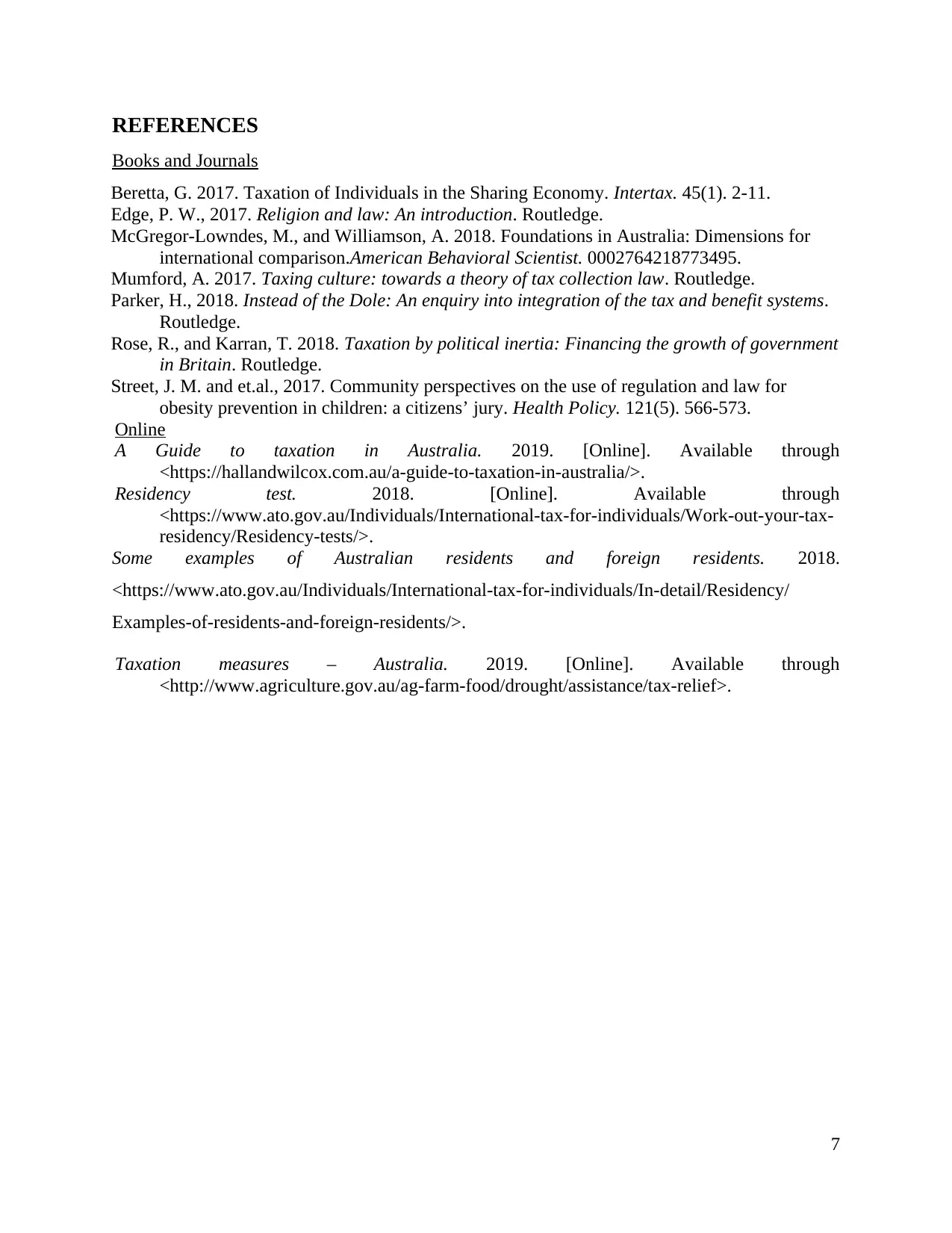
REFERENCES
Books and Journals
Beretta, G. 2017. Taxation of Individuals in the Sharing Economy. Intertax. 45(1). 2-11.
Edge, P. W., 2017. Religion and law: An introduction. Routledge.
McGregor-Lowndes, M., and Williamson, A. 2018. Foundations in Australia: Dimensions for
international comparison.American Behavioral Scientist. 0002764218773495.
Mumford, A. 2017. Taxing culture: towards a theory of tax collection law. Routledge.
Parker, H., 2018. Instead of the Dole: An enquiry into integration of the tax and benefit systems.
Routledge.
Rose, R., and Karran, T. 2018. Taxation by political inertia: Financing the growth of government
in Britain. Routledge.
Street, J. M. and et.al., 2017. Community perspectives on the use of regulation and law for
obesity prevention in children: a citizens’ jury. Health Policy. 121(5). 566-573.
Online
A Guide to taxation in Australia. 2019. [Online]. Available through
<https://hallandwilcox.com.au/a-guide-to-taxation-in-australia/>.
Residency test. 2018. [Online]. Available through
<https://www.ato.gov.au/Individuals/International-tax-for-individuals/Work-out-your-tax-
residency/Residency-tests/>.
Some examples of Australian residents and foreign residents. 2018.
<https://www.ato.gov.au/Individuals/International-tax-for-individuals/In-detail/Residency/
Examples-of-residents-and-foreign-residents/>.
Taxation measures – Australia. 2019. [Online]. Available through
<http://www.agriculture.gov.au/ag-farm-food/drought/assistance/tax-relief>.
7
Books and Journals
Beretta, G. 2017. Taxation of Individuals in the Sharing Economy. Intertax. 45(1). 2-11.
Edge, P. W., 2017. Religion and law: An introduction. Routledge.
McGregor-Lowndes, M., and Williamson, A. 2018. Foundations in Australia: Dimensions for
international comparison.American Behavioral Scientist. 0002764218773495.
Mumford, A. 2017. Taxing culture: towards a theory of tax collection law. Routledge.
Parker, H., 2018. Instead of the Dole: An enquiry into integration of the tax and benefit systems.
Routledge.
Rose, R., and Karran, T. 2018. Taxation by political inertia: Financing the growth of government
in Britain. Routledge.
Street, J. M. and et.al., 2017. Community perspectives on the use of regulation and law for
obesity prevention in children: a citizens’ jury. Health Policy. 121(5). 566-573.
Online
A Guide to taxation in Australia. 2019. [Online]. Available through
<https://hallandwilcox.com.au/a-guide-to-taxation-in-australia/>.
Residency test. 2018. [Online]. Available through
<https://www.ato.gov.au/Individuals/International-tax-for-individuals/Work-out-your-tax-
residency/Residency-tests/>.
Some examples of Australian residents and foreign residents. 2018.
<https://www.ato.gov.au/Individuals/International-tax-for-individuals/In-detail/Residency/
Examples-of-residents-and-foreign-residents/>.
Taxation measures – Australia. 2019. [Online]. Available through
<http://www.agriculture.gov.au/ag-farm-food/drought/assistance/tax-relief>.
7
⊘ This is a preview!⊘
Do you want full access?
Subscribe today to unlock all pages.

Trusted by 1+ million students worldwide

8
1 out of 10
Related Documents
Your All-in-One AI-Powered Toolkit for Academic Success.
+13062052269
info@desklib.com
Available 24*7 on WhatsApp / Email
![[object Object]](/_next/static/media/star-bottom.7253800d.svg)
Unlock your academic potential
Copyright © 2020–2026 A2Z Services. All Rights Reserved. Developed and managed by ZUCOL.





